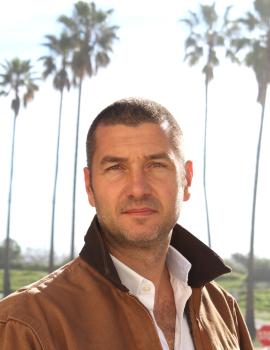
Microplastics under a microscope. Image Credit: Anna Perko, Staff Scientist
Four Bren School faculty members contributed their expertise to a new PBS documentary examining the environmental consequences of fast fashion and exploring sustainable solutions for the textile industry.
Professors Roland Geyer, Patricia Holden, Arturo Keller, and Sage Davis shared their research on microplastic pollution, textile waste management, and circular economy approaches in the documentary, which investigates how the fashion industry contributes to ocean pollution, chemical contamination, and resource depletion.
Faculty Contributions
Professor Roland Geyer discussed his lifecycle assessment research, revealing that washing synthetic clothing generates approximately 360 kilotons of microfibers annually. His work emphasizes behavioral solutions alongside technical innovations, noting that simple changes like washing in cold water can significantly reduce environmental impacts.
Professor Patricia Holden presented collaborative research with the fast fashion industry on microfiber emissions during domestic laundering. Her team's experiments demonstrate how washing machine type, water temperature, and agitation patterns affect fiber release into water systems.
Professor Arturo Keller highlighted the scale of microfiber pollution, explaining how millions of microscopic fibers shed during each wash cycle accumulate into a significant environmental challenge when multiplied across global laundry practices.
Sage Davis (MESM ‘24) showcased innovative textile recycling technology using pyrolysis to transform discarded fabrics into useful carbon-based materials. This process, which heats textiles to over 700°F in the absence of oxygen, creates products suitable for soil amendments and industrial applications.
Research Impact
The documentary underscores UCSB's leadership in addressing textile pollution through interdisciplinary research. The featured work spans material science, environmental engineering, and industrial ecology, offering both immediate behavioral interventions and long-term technological solutions.
The Bren faculty's contributions demonstrate how scientific research can inform industry practices and consumer behavior to reduce fashion's environmental footprint. Their collaborative approach with industry partners ensures research findings translate into practical applications.






